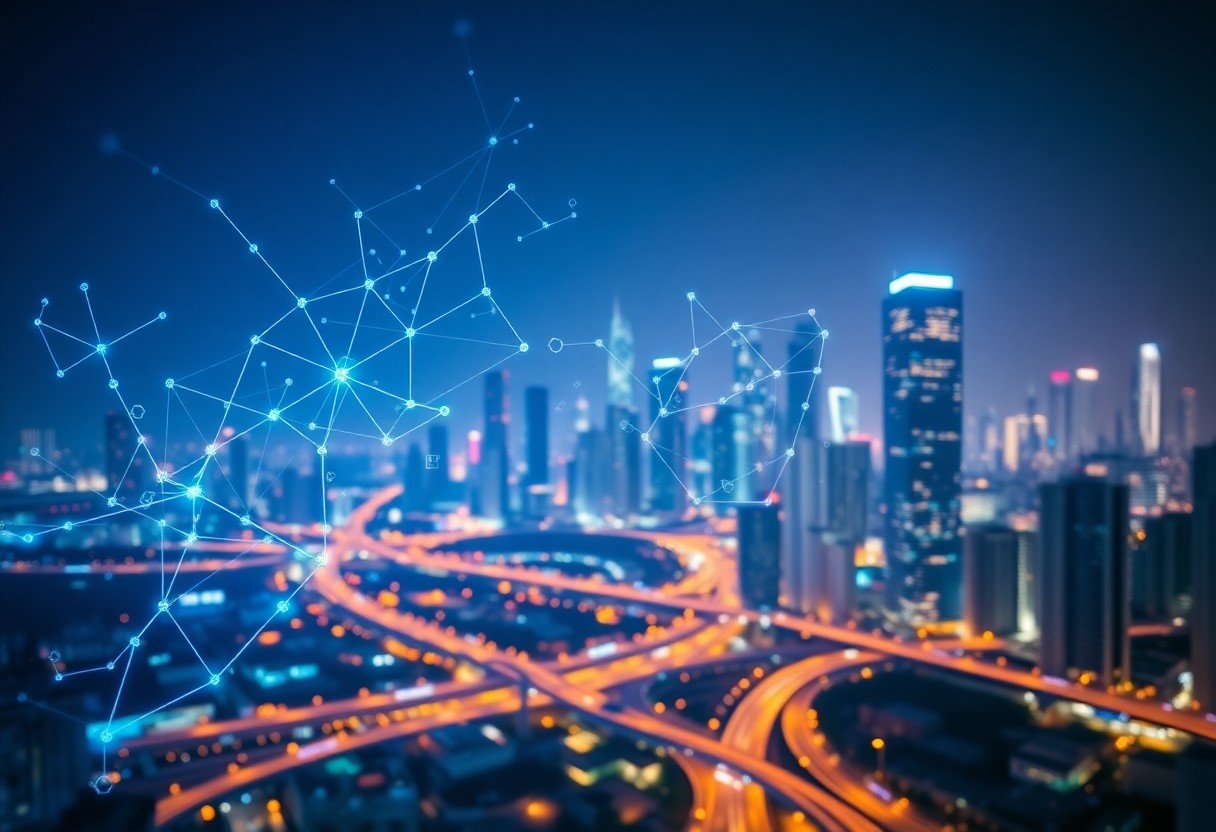Now Reading: AI and Blockchain Convergence – Exploring New Frontiers in Decentralized Applications
-
01
AI and Blockchain Convergence – Exploring New Frontiers in Decentralized Applications
AI and Blockchain Convergence – Exploring New Frontiers in Decentralized Applications

It’s an exciting time for technology enthusiasts as the convergence of AI and blockchain is paving the way for revolutionary decentralized applications. By leveraging the strengths of AI’s data processing and blockchain’s security, you can explore new potentials in various sectors, enhancing transparency, efficiency, and automation. However, this integration also presents unique challenges and risks that require careful navigation. In this post, you will probe into these transformative technologies and uncover how they are reshaping the digital landscape, offering both opportunities and threats for the future.
Key Takeaways:
- The convergence of AI and blockchain technology offers enhanced security and transparency in decentralized applications, fostering trust among users.
- Integrating AI with blockchain can optimize resource allocation, enable smarter contracts, and improve decision-making processes in various industries.
- This intersection can unlock new business models and streamline operations, paving the way for innovative solutions in finance, healthcare, supply chain, and beyond.
Foundations of AI and Blockchain
Before stepping into the convergence of these two transformative technologies, it’s important to grasp the foundational concepts behind Artificial Intelligence and Blockchain. The Innovative Convergence of Blockchain and Explainable AI highlights how these realms are beginning to intersect, unlocking new potentials in decentralized applications. Understanding the underpinning principles will allow you to appreciate how they can fortify each other to address contemporary challenges.
Core Concepts of Artificial Intelligence
About Artificial Intelligence (AI), it encompasses the development of algorithms that enable machines to perform tasks traditionally requiring human intelligence. By leveraging vast data sets, AI can learn, reason, and even adapt over time. This capability allows for automation in decision-making processes, providing enhanced efficiency and productivity across various sectors, from healthcare to finance.
Basics of Blockchain Technology
Across the digital landscape, Blockchain technology provides a decentralized framework for recording transactions securely and transparently. By enabling peer-to-peer interactions through a distributed ledger system, it ensures that all participants in the network can verify and validate transactions independently.
Blockchain fundamentally alters your perception of data and trust. It operates on a network of nodes, where information is stored in blocks that are immutable and linked together, creating a secure chain. This structure not only enhances security but also mitigates the risk of fraud and manipulation. Importantly, by decentralizing control, blockchain empowers individuals and organizations to facilitate transparent interactions without the need for a central authority. As you explore this technology, you will find it offers a promising paradigm shift with both opportunities and challenges that can significantly impact various industries.
Synergies Between AI and Blockchain
There’s a transformative interplay between AI and blockchain technologies that holds immense potential for innovation. By integrating AI’s cognitive abilities with blockchain’s immutable ledger, you have the opportunity to create more intelligent and secure decentralized applications. This fusion allows for real-time data analysis, automated processes, and enhanced decision-making, enabling seamless interactions while protecting user privacy and data integrity. As you explore these synergies, you’ll uncover a myriad of pathways to enhance efficiency and trust across various sectors.
Enhancing Security and Trust Through AI
After recognizing the rising threats to data integrity and security, you can leverage AI to bolster the strengths of blockchain technology. AI algorithms can analyze transaction patterns and detect anomalies, thereby identifying fraud and malicious activities in real time. This proactive approach empowers users to have more trust in decentralized systems, enhancing layer of protection and accountability. Implementing such AI-driven insights can significantly strengthen your security measures while establishing a robust framework for safe interactions in the decentralized space.
Decentralized AI Models and Smart Contracts
Contracts can revolutionize the way you think about AI by combining decentralized models with smart contracts. By enabling AI models to operate on a blockchain, you can create self-executing contracts that adapt to real-world conditions and automatically enforce agreements without intermediaries. This innovation not only enhances efficiency but also invokes trust, as transactions are transparent and verifiable. As you explore this terrain, you’ll find that the integration of decentralized AI and smart contracts fosters greater collaboration and opens new avenues for innovation.
To fully harness the potential of decentralized AI models and smart contracts, you should appreciate how they can empower various applications. Leveraging decentralized AI allows you to build intelligent systems that learn from data patterns without relying on central authorities. This autonomy can lead to a more equitable distribution of resources and data ownership. Moreover, combining AI with smart contracts facilitates automated execution that reacts to verified events, thus reducing fraud and errors. By embracing this innovative convergence, you stand to gain a competitive edge while bolstering trust and transparency in your operations.
Use Cases of AI-Blockchain Integration
Despite the distinct nature of AI and blockchain, their convergence opens up innovative opportunities across various sectors. By leveraging AI’s predictive analytics alongside blockchain’s transparency and security, you’re empowered to create decentralized applications that are not only more efficient but also trustworthy. This integration is constantly evolving, paving the way for groundbreaking use cases that could redefine industries.
Autonomous Financial Systems
One exciting application of AI-blockchain integration is in autonomous financial systems. By combining AI’s decision-making capabilities with blockchain’s secure, tamper-proof ledger, you can build robust systems that automate financial transactions and enhance risk management. This leads to more efficient operations, cost reduction, and improved accuracy, pushing the boundaries of traditional finance.
Supply Chain Optimization
Integration of AI and blockchain can significantly enhance supply chain optimization. You can utilize AI analytics for real-time data processing while harnessing blockchain for secure and transparent record-keeping, ensuring that every step in your supply chain is verifiable.
With this combination, the flow of goods and information becomes streamlined, reducing delays and costs. You can track products from their origin to final delivery, ensuring authenticity and accountability. Moreover, predictive analytics powered by AI can alert you to potential disruptions, allowing proactive measures to mitigate risks, leading to a more resilient supply chain overall.
Decentralized Identity and Privacy
Integration of AI and blockchain also plays a vital role in decentralized identity and privacy solutions. You can leverage AI to analyze user data while maintaining the privacy and security benefits of blockchain technology, allowing you to control your own identity without the risk of it being misused.
Another advantage of decentralized identity is that it empowers you to manage your personal information securely. By utilizing blockchain, you ensure that your identity data is stored in a secure manner, protecting it from unauthorized access. This paradigm shift allows you to share your information selectively while retaining ownership, significantly enhancing individual privacy and control over personal data.
Challenges and Risks
Your exploration of AI and Blockchain convergence reveals significant challenges and risks that must be navigated. These technologies, while groundbreaking, introduce complex issues surrounding scalability, performance, and ethical standards that cannot be ignored. Addressing these challenges is important for the sustainable development of decentralized applications.
Scalability and Performance Issues
Behind the scenes, the integration of AI and Blockchain often leads to scalability and performance challenges. As data processing demands increase with AI’s complex algorithms, the limitations of Blockchain technology in handling large volumes of transactions become evident. This can create bottlenecks and slow down the overall system efficiency.
Ethical and Regulatory Concerns
Concerns regarding ethical and regulatory frameworks are vital when merging AI with Blockchain technologies. Your innovations must align with existing laws while addressing potential biases in AI algorithms, data privacy, and the environmental impact of Blockchain. These issues can significantly affect public trust and adoption.
In addition, addressing ethical considerations is important for fostering public confidence in your AI applications. As Blockchain enables data transparency, any biases in AI systems can become apparent, raising questions about accountability. Moreover, the varying regulatory landscapes across regions create an uncertain environment for developers, necessitating adherence to legal standards while pushing technological boundaries. Balancing innovation and compliance is key to mitigating risks associated with ethical concerns.
Future Prospects and Innovations
Many experts believe that the intersection of AI and blockchain will revolutionize various sectors, leading to productivity enhancements and innovative solutions. As you explore these future prospects, you’ll discover how decentralized applications can transform industries such as finance, supply chain, and healthcare through enhanced security, transparency, and efficiency.
Emerging Trends in AI-Blockchain Applications
Around the globe, you’ll notice emerging trends where AI and blockchain are being integrated to create smarter decentralized applications. These trends include the use of AI algorithms to optimize smart contracts, enhance transaction validations, and improve real-time data analytics across various networks, making your applications faster and more efficient.
Potential Breakthroughs and Market Impact
Along with promoting new efficiencies, the integration of AI and blockchain might lead to significant breakthroughs that can disrupt traditional markets. As you research into these advancements, consider how they can enhance user experiences, protect data integrity, and foster trust among users, which can ultimately reshape your business landscape.
Applications of AI and blockchain hold the potential to bring about transformative changes in various sectors, amplifying both efficiency and security. This convergence may lead to innovative business models that cater to evolving consumer demands. Success stories could emerge from improved data integrity and the reduction of fraud, establishing a more trustworthy environment for users. However, keep in mind the risks associated with such integrations, as failures could have significant negative ramifications, highlighting the importance of robust frameworks in your implementation strategies.
Summing up
With these considerations, you can appreciate the immense potential that arises from the convergence of AI and blockchain technologies. By leveraging AI’s analytical power alongside blockchain’s security and transparency, you can explore innovative decentralized applications that enhance efficiency, trust, and user experiences. As you navigate this evolving landscape, staying informed about these advancements will empower you to harness their benefits and apply them within your own ventures.
FAQ
Q: What is the significance of the convergence between AI and blockchain technologies?
A: The convergence of AI and blockchain technologies presents a unique opportunity to enhance decentralized applications. AI can improve data analysis and decision-making processes in blockchain systems, leading to more efficient and automated workflows. On the other hand, blockchain provides a transparent and secure environment for AI algorithms, protecting intellectual property and sensitive data. Together, they can create innovative solutions across various domains, such as finance, healthcare, and supply chain management, thus driving advancements in how digital services are delivered and managed.
Q: How can AI enhance the functionality of decentralized applications (dApps)?
A: AI can enhance decentralized applications by introducing smarter algorithms that can learn from user interactions and optimize performance over time. For example, AI-driven dApps can analyze user behavior to provide personalized experiences, predict market trends, or identify anomalies in transaction patterns, safeguarding the system from potential fraud. By integrating machine learning capabilities, dApps can continuously improve their service offerings, making them more responsive and efficient, ultimately attracting a wider user base and increasing adoption rates.
Q: What are some challenges faced in integrating AI with blockchain technology?
A: Integrating AI with blockchain technology poses several challenges. One major issue is the scalability of blockchain networks, as AI algorithms often require large datasets for training, which can strain blockchain’s capacity for handling high volumes of data quickly. Additionally, privacy concerns arise when sensitive data is involved; ensuring that AI models do not compromise data security is imperative. Moreover, the need for interoperability among numerous blockchain platforms can complicate AI deployment across different ecosystems. Addressing these challenges is vital for unlocking the full potential of AI and blockchain convergence.























